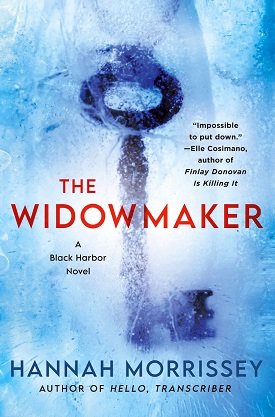Summer 2018’s Hottest Outdoor Thrillers
BEARSKIN by James McLaughlin & STAY HIDDEN by Paul Doiron
If I had to name one thing that I love most about Crime by the Book, it’s how this passion project of mine has opened my eyes to all different subgenres and styles of crime fiction. My horizons have been expanded time and time again—but if I had to name one subgenre of crime fiction I’m still looking to learn more about, it would be the subgenre of outdoor thrillers. Thankfully, Summer 2018 has brought with it two examples of the subgenre that have totally piqued my interest! BEARSKIN by James McLaughlin (on sale now) and STAY HIDDEN by Paul Doiron (on sale July 3rd) are buzzworthy for all the best reasons: gorgeous covers, fresh plots, and authors who bring unique backgrounds to their crime writing. I was thrilled to have the chance to ask a few of my most pressing questions of both authors! Read on for a conversation on outdoor thrillers with James McLaughlin and Paul Doiron - and for details on their newest releases!
Many thanks to Paul and James for answering my questions so thoughtfully, and to their publishers for facilitating this Q&A.
Book Details: BEARSKIN by James McLaughlin
Ecco; June 12, 2018
Rice Moore is just beginning to think his troubles are behind him. He’s found a job protecting a remote forest preserve in Virginian Appalachia where his main responsibilities include tracking wildlife and refurbishing cabins. It’s hard work, and totally solitary—perfect to hide away from the Mexican drug cartels he betrayed back in Arizona. But when Rice finds the carcass of a bear killed on the grounds, the quiet solitude he’s so desperately sought is suddenly at risk.
More bears are killed on the preserve and Rice’s obsession with catching the poachers escalates, leading to hostile altercations with the locals and attention from both the law and Rice’s employers. Partnering with his predecessor, a scientist who hopes to continue her research on the preserve, Rice puts into motion a plan that could expose the poachers but risks revealing his own whereabouts to the dangerous people he was running from in the first place.
“One of the year’s most buzzy, fascinating thrillers. . . . A suspenseful, emotionally resonant journey into one man’s dark past.” (Entertainment Weekly)
“A journey into the wilds of Appalachia. . . . Tightly plotted and beautifully written, Bearskin marks an auspicious debut.” (Nylon Magazine)
“Bearskin—a gripping tale written in spare, beautiful prose—tells the tale of Rice Moore, a reluctant hero, competent, resilient, and utterly engaging. McLaughlin is a gifted storyteller, and Bearskin is a remarkable debut.” (Scott Smith, NYT Bestselling author of A Simple Plan and The Ruins)
Book Details: STAY HIDDEN by Paul Doiron
Minotaur Books; July 3, 2018
A woman has been shot to death by a deer hunter on an island off the coast of Maine. To newly promoted Warden Investigator Mike Bowditch, the case seems open and shut. But as soon as he arrives on remote Maquoit Island he discovers mysteries piling up one on top of the other.
The hunter now claims he didn’t fire the fatal shot and the evidence proves he’s telling the truth. Bowditch begins to suspect the secretive community might be covering up the identity of whoever killed the woman, known as Ariel Evans. The controversial author was supposedly writing a book about the island's notorious hermit. So why are there no notes in her rented cottage?
The biggest blow comes the next day when the weekly ferry arrives and off steps the dead woman herself. Ariel Evans is alive, well, and determined to solve her own “murder” even if it upsets Mike Bowditch’s investigation and makes them both targets of an elusive killer who will do anything to conceal his crimes.
"Outstanding." ―Publishers Weekly (starred review)
"The extraordinary sense of place makes this Doiron's strongest novel yet." ―Booklist (starred review)
"A bona fide contender for best crime novel of the year." ―Ryan Steck, The Real Book Spy
A Conversation with James McLaughlin & Paul Doiron
Crime by the Book: Can you share a bit about where you set your novel, and how you came to set it there?
James McLaughlin: The germ of the story—it wasn’t much more sophisticated than “What would you do if you caught bear poachers on your property?”—first came to me after I heard poachers were leaving mutilated bear carcasses in the woods near my family’s farm in western Virginia. It seemed natural to start with familiar geography, so I warped and blended several real counties in the area and eventually came up with the fictional “Turpin County.” For the property where most of the action happens, I took a particular tract of mountain land I’ve spent a lot of time exploring and juiced everything about it a hundred-fold…while keeping the basic layout and contours intact. I could glance at the framed topo map on the wall and imagine my characters moving around up there.
Paul Doiron: STAY HIDDEN takes place on fictional Maquoit Island, which is located twenty-miles or so southeast of Acadian National Park, and is served in the off-season by a ferry that runs only once a week. Most of my prior novels have taken place in the woods and mountains, but I grew up along the Maine coast and have lived here most of my life, and I have wanted for a long time to come up with a story that gives my game warden an excuse to visit one of the state’s offshore communities. Some Maine islands have deer on them, and where you have deer, you have hunters and the potential for what wardens call a “hunting homicide.” That was the realization that spurred the writing of STAY HIDDEN.
CBTB: Paul, as you mentioned, STAY HIDDEN is actually set in a fictional island off the coast of Maine that you literally map out for readers in your book. Why was it important to you that you provide readers with this level of detail?
PD: I have spent a lot of time on Maine’s offshore islands over the years. Many of them see thousands of visitors in the summer. Then the winter comes, and you have a population of fifty to a hundred lobstermen living in extreme, claustrophobic isolation. The map was something I found I needed for verisimilitude. I wanted my fictional island to be the foggiest place on the Atlantic seaboard and that required that Maquoit be located in a specific spot in the Gulf of Maine and that it have a wetland at its center to create a sharp temperature differential between the land and the ocean. This might sound like overthinking, but my books depend to a great degree on Mike Bowditch’s understanding and observation of the natural world; I can’t afford to fudge details because doing so undermines the stories themselves. I also wanted to show readers who have spent summers on Maine’s beautiful islands — who think they know these places — the harsh realities that close in after the vacation season ends.
CBTB: Your books have in common that they are set in the region of the country in which you grew up. How essential was this personal connection to the writing of your book? Did you ever toy with setting the book elsewhere?
JML: That connection was important because it allowed me to tap into whatever deep imprinting occurred when I spent so much time there as a kid and a teenager. It’s not like I planned it, but in retrospect I think it makes the book richer and more authentic. And being 1,800 miles away in Utah during most of the rewriting—with intermittent visits each year to spend time with my mother at the farm—required me to mine those memories more completely, getting at stuff below the surface. Hopefully the book goes beyond what the area looks like and who lives there—I’m more concerned with psychological and emotional responses to place. And I did move the setting around a bit now and then, but only trivially: north a ways to be closer to D.C., south to be closer to the James River. So much of the texture of the story depends upon that central Appalachian forest, I could only move the setting so far.
PD: Sooner or later, Mike Bowditch might set foot outside of Maine — although he doesn’t seem to be in a rush to do. There’s always a need to balance one’s creative interests with what your readers expect when they pick up a book in a series tied to a specific region. Are people clamoring for Mike to stumble into a murder investigation while he’s on vacation in Florida, fishing for tarpon? I am not convinced.
CBTB: What is it about a rural or remote location that makes it a compelling backdrop for a crime story?
PD: We live in a country that is becoming increasingly and alarmingly (in my mind) urban. I have had the interesting experience, as a Maine guide, of seeing how freaked out people can get in the woods. They are more scared of being in the forest at night than they would be walking through a dark alley back home. I think the fear comes, in part, from the recognition that no one is nearby to hear you cry for help. Or if people are nearby they might belong to these strange, potentially secretive tribes. Certainly Maine’s year-round islands communities can come off as being unwelcoming and threatening to strangers who “don’t belong."
JML: I’m interested in crime stories and thrillers where the non-human world is a powerful but morally neutral (and sometimes brutal) quasi-character interacting with the human characters. That’s a lot more possible away from the city and suburbs.
CBTB: What do you consider the unique challenges (or benefits!) of setting a crime novel in a more sparsely-populated part of the country?
JML: The main benefit for me is the one I alluded to above: the prevalence of vast, inhuman, engulfing forces that the characters can push against and get pushed by. I’m not sure I’d know how to write a story without that. But certainly there are challenges, one being that you have fewer people to work with, and you need criminals for a crime novel, and you have to be really careful not to give the absurd impression that most or even very many people who live in rural settings are criminals. Another big challenge is most readers live in cities; if your setting is entirely rural, you have to work to gain and hold urban readers’ interest, to make them care about what’s happening in a place that they might be inclined to dismiss as inconsequential.
PD: I find that the greatest challenge is that most of my readers don’t bring to the books the same familiarity with natural settings that they do for urban ones. If you write a police procedural set in a city, you don’t have to spend as much time setting the scene. Most of us have a basic understanding of what a subway station feels like, for instance. It’s different when your mystery is set on a cold and foggy island where deer outnumber people, as they do on Maquoit. What does such a place look like where the deer have destroyed the gardens and eaten the shrubs and the low-hanging branches of the trees, and must resort to browsing on seaweed of all things? STAY HIDDEN is about a suspicious deer-hunting incident that might or might not be a cover for murder. I couldn’t afford to ignore the deer.
CBTB: James - early reviews for your debut novel BEARSKIN have zeroed in on the book’s exceptional and vivid portrait of the American wilderness. What do you hope readers most take away from their foray into Appalachia through the pages of your debut?
JML: The Appalachian forest is rich and diverse, and there’s a lot more going on there than people think. Maybe I’m going for a bit of de-familiarization: I hope a few readers driving on the interstate or flying across the country will consider that the apparently uninhabited land they’re looking at is not just scenery. Just for a moment they might imagine the lives and the drama—human and otherwise—being lived in those places.
CBTB: How important do you consider your protagonist’s interaction with his environment to your book? Are there elements of your character that have grown or developed as a direct result of this relationship, between man and wilderness?
PD: In the case of Mike Bowditch, this is absolutely so. He has chosen a life outdoors in the woods and on the waters because he finds the modern, urbanized, industrial world a place of sensory overload. In the wilderness, in order to do his job as a game warden, he must pay attention to small disturbances. No detail can be dismissed immediately as insignificant. In one of the books, his girlfriend brands Mike a “compulsive noticer.” It is this quality in him, I believe, that not only makes him a good warden but a good solver of crimes in general. I am a strong believer in activities that force us to pay attention in the moment, it probably goes without saying.
JML: It’s central: Rice Moore’s choices have brought him through various traumas to a circumstance where he’s cracked open, highly susceptible to over-perception of the rich, complex, sometimes violent forest seething around him. He lacks myth, religion, and community: he’s out there by himself, and as Dostoevsky pointed out, to be too acutely conscious is to be diseased. Rice sees a lot, but he also goes to some strange places in his head. He does some extreme things.
Many thanks to Paul and James for taking the time to answer my questions so thoughtfully! Details for both books are below; BEARSKIN is on sale now, and STAY HIDDEN releases July 3rd!
Book Details:
BEARSKIN by James McLaughlin
Hardcover: 352 pages
Publisher: Ecco (June 12, 2018)
Language: English
ISBN-10: 0062742795
ISBN-13: 978-0062742797
STAY HIDDEN by Paul Doiron
Series: Mike Bowditch Mysteries (Book 9)
Hardcover: 336 pages
Publisher: Minotaur Books (July 3, 2018)
Language: English
ISBN-10: 1250102383
ISBN-13: 978-1250102386
Crime by the Book is a participant in the Amazon Services LLC Associates Program, an affiliate advertising program designed to provide a means for sites to earn advertising fees by advertising and linking to Amazon.com. This in no way affects my opinion of the above books.


















Home ownership feel like a distant dream? Zillow listings have you convinced you’ll be renting for the rest of your life? The woman at the heart of Carissa Orlando’s debut The September House feels your pain—and she’s prepared to put up with a lot if it means she and her husband can finally have a place to call their own. In this case, that might just mean living in a house that’s haunted. Playful and irreverent, spine-tingling and spooky, The September House puts a fresh spin on the classic haunted house story, delivering an immersive tale about the secrets lurking within one building’s walls, and within the lives of its inhabitants.